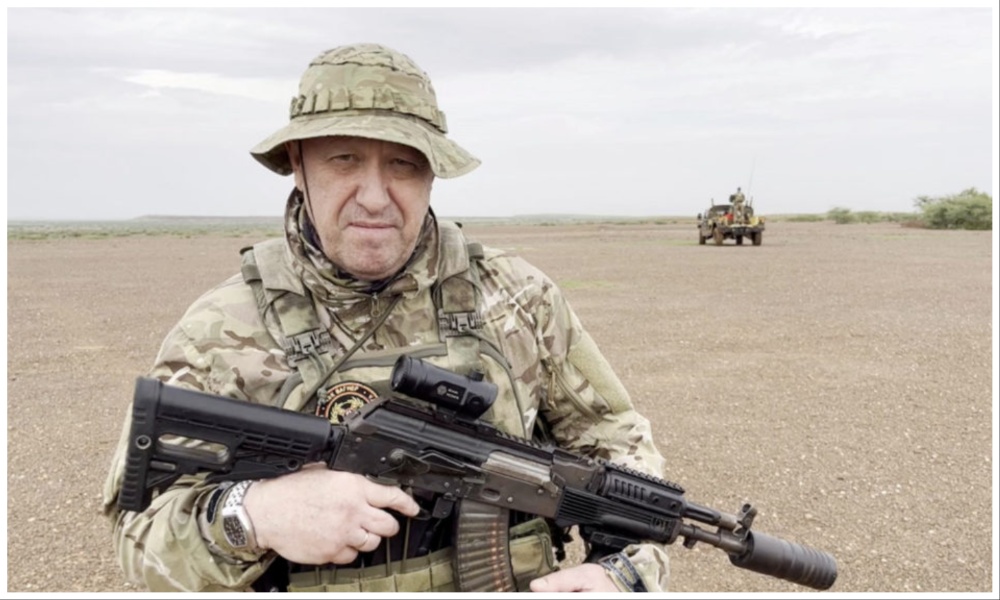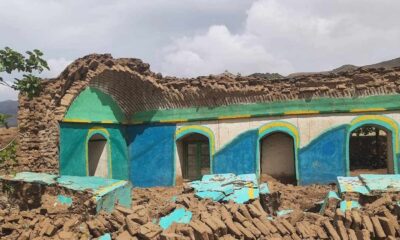Featured
Fences go up around apartment buildings as China tightens Shanghai lockdown

Shanghai authorities battling an outbreak of COVID-19 have erected tall fences outside some residential buildings, sparking fresh public outcry over a lockdown that has forced much of the city’s 25 million population to stay at home.
Images of white hazmat-suit-clad workers sealing entrances of housing blocks and closing off entire streets with roughly two meter-tall green fencing went viral on social media on Saturday, prompting questions and complaints from residents, Australia’s AAP news agency reported.
“Isn’t this a fire hazard?,” asked one user on social media platform Weibo.
“This is so disrespectful of the rights of the people inside, using metal barriers to enclose them like domestic animals,” said another.
The Shanghai government did not respond to a request for comment.
Most of the barriers appeared to have been erected around compounds designated as “sealed areas”, which are buildings where at least one person has tested positive for COVID-19, resulting in residents being forbidden from leaving their homes.
Shanghai, China’s largest city and most important economic hub, is battling the country’s biggest-ever reported COVID-19 outbreak with a policy that forces all positive cases into central quarantine facilities.
The lockdown, which for many residents has lasted more than three weeks, has fuelled frustration over difficulties accessing food and medical care as well as lost wages, family separation, conditions at quarantine centers, and censorship of efforts to vent online.
On Shanghai recorded 19,657 new asymptomatic cases, versus 20,634 a day earlier, and 1,401 symptomatic cases, down from 2,736.
Meanwhile, Beijing recorded 22 new cases – all locally transmitted – compared to six the day before.
Featured
UN food agency cuts rations to 2 million Afghans as funds dry up

The UN World Food Programme (WFP) had to cut rations to another two million Afghans this month and is warning of a “catastrophic” winter if funding runs out with little food for remote communities in place, the agency’s country director said.
The cut in rations comes amidst growing alarm over shrinking aid for Afghanistan, where a UN humanitarian response plan is only about a quarter funded, even after the budget was downgraded in the face of funding shortfalls.
WFP funding for food and cash assistance is expected to run out by the end of October and the agency has had to steadily cut assistance through the year to 10 million Afghans.
The positioning of food to areas that will be cut off in winter has also been limited. The WFP said if no funding comes through, 90% of remote areas in need will be cut off without food and even in accessible locations, people will get no supplies during the harsh weather.
“That is the catastrophe that we have to avert,” WFP Afghanistan Country Director Hsiao-Wei Lee told Reuters.
About three-quarters of Afghanistan’s people are in need of humanitarian aid as their country emerges from decades of conflict under an internationally isolated IEA administration that took over as US-backed foreign forces withdrew in 2021.
Development assistance that for years formed the backbone of government finances has been cut and the administration is subject to sanctions and central bank assets abroad have been frozen.
Restrictions by the Islamic Emirate on women, including stopping most female Afghan humanitarian staff from working, are an obstacle to formal recognition and have also put off donors, many of whom have turned their attention to other humanitarian crises.
“What I do in my engagements with them is remind them that at the end of the day, we must focus on those who are most in need,” Lee said of donors.
“The cost of inaction is ultimately borne and paid for by the most vulnerable and poor mothers and children.”
Three million people are now getting food aid but after October, they might be getting nothing.
The WFP needs $1 billion in funding to provide food aid and carry out planned projects until March, Lee said.
For Kabul resident Baba Karim, 45, the cash he has got twice this year from the WFP has been a vital supplement to the less than $2 a day he earns working odd jobs at a market with a push cart.
“I’m so worried about what will happen next, now that the assistance has ended,” said the father of five.
“I lie awake at night worrying about the future of my children.”
Featured
Pulisic scores again to help Milan thrash Torino, Roma slump to Verona loss

AC Milan forward Christian Pulisic struck to set Stefano Pioli’s side on their way to a 4-1 thrashing of Torino in their opening home game of the season in Serie A on Saturday, while Hellas Verona snatched a 2-1 victory over visitors AS Roma.
Pulisic’s opener, two Olivier Giroud penalties and a close-range lob by Theo Hernandez moved Milan provisionally top after they got off to a winning 2-0 start at Bologna on Monday.
“An excellent match, the weekly work made us level up,” Pioli told DAZN. “The team has made an important journey in recent years and top-level reinforcements have arrived… A good group is forming in terms of attitude, availability.”
U.S. international Pulisic looks set to become a new idol at the San Siro after his move from Chelsea as he put Milan ahead in the 33rd minute by firing home from close range in front of a capacity crowd for his second goal in two games, Reuters reported.
Torino defender Perr Schuurs temporarily spoiled the mood when he leveled three minutes later with a first-time effort but that was the visitors’ only shot on target all night.
Giroud restored Milan’s lead with a penalty minutes before halftime, calmly firing the ball into the roof of the net after the hosts were awarded a penalty for handball.
Hernandez chipped goalkeeper Vanja Milinkovic-Savic to add the third in first-half stoppage time following a couple of one-twos with Rafael Leao before Frenchman Giroud converted another spot kick in the second half after Schuurs’ foul on Leao.
Torino, who were held to a 0-0 draw at home by newly-promoted Cagliari on Monday, lacked the ideas to pose any danger in front of Mike Maignan’s goal as Milan kept the ball and continued pushing to increase the scoreline.
Roma disappoint
Jose Mourinho’s Roma fell short at Verona who were quick to take the lead when midfielder Ondrej Duda scored from close range in less than four minutes after visiting goalkeeper Rui Patricio saved a fierce long-range shot by Filippo Terracciano.
Roma had a golden chance to equalize shortly after through midfielder Lorenzo Pellegrini who controlled the ball on the edge of the box but his low shot went inches wide, Reuters reported.
Instead, Verona doubled their lead in first-half stoppage time through forward Cyril Ngonge who left the Milan defense standing as he netted on the counter with a solo run.
Algeria midfielder Houssem Aouar pulled one back for Roma after the break but the visitors were unable to rescue a draw despite Verona finishing with 10 men following an 84th minute red card for Isak Hien for a foul on Andrea Belotti.
Verona, who secured another season in Serie A via a relegation playoff last term, are provisionally second after winning their opening match at Empoli 1-0.
“We conceded an avoidable goal which intimidated us a bit … (but) these matches create mentality and a strong identity,” new Verona manager Marco Baroni told a press conference.
Roma, who were still without Mourinho as he serves a 10-day touchline ban for criticising a referee at the end of last season, have one point after being held to a 2-2 draw by visiting Salernitana last weekend.
Featured
Wagner chief on passenger list of crashed plane

The head of the Wagner group, which in June attempted to topple Russia’s military leadership, was registered to fly on a plane that crashed Wednesday, Russian news agencies said.
The whereabouts of Yevgeny Prigozhin were yet to be officially confirmed, but news of the crash that is believed to have left no survivors triggered reactions from Ukraine and the United States, AFP reported.
The incident took place exactly two months since Prigozhin’s rebellion — seen as the biggest challenge to Russian President Vladimir Putin’s authority since he came to power — and as uncertainty has surrounded the fate of Wagner and its controversial chief.
Russia’s ministry for emergency situations on Wednesday announced the crash of a private plane travelling between Moscow and Saint Petersburg.
According to preliminary information, all 10 people on board died, including three crew members, the ministry said.
Russian news agencies later reported Prigozhin on the list of passengers of the plane.
“The plane that crashed in the Tver Region listed Yevgeny Prigozhin among its passengers, (Russia’s aviation agency) Rosaviatsia said,” TASS news agency reported, with RIA Novosti and Interfax issuing similar reports.
Videos on Telegram channels linked to Wagner posted footage — that AFP could not independently confirm — showing the wreckage of the plane burning in a field.
Rosaviatsia said it set up a special commission to investigate the crash of the Embraer – 135 (ЕВМ-135BJ) belonging to MNT-Aero.
Russia’s Investigative Committee, which probes serious crimes, said it opened an investigation into the crash.
The bodies of eight people have been found so far at the site of the crash, RIA Novosti said citing the emergency services.
Putin was meanwhile giving a speech for the 80th anniversary of the Kursk battle in World War II.
He did not mention the crash and hailed “all our soldiers who are fighting bravely and resolutely” in the special military operation in Ukraine.
But rumors of Prigozhin’s death reached other capitals, with Kyiv and Washington reacting.
“I don’t know for a fact what happened, but I’m not surprised,” US President Joe Biden said.
“There’s not much that happens in Russia that (President) Putin’s not behind. But I don’t know enough to know the answer.”
Ukrainian presidential aide Mykhaylo Podolyak said on social media that the plane crash was “a signal from Putin to Russia’s elites ahead of the 2024 elections. ‘Beware! Disloyalty equals death’.”
During the offensive in Ukraine, launched on February 24, 2022, Prigozhin — who previously operated in the shadows — came into the spotlight.
He spearheaded the capture of several Ukrainian towns including Bakhmut — and harshly criticised Russia’s conventional military leadership.
But Prigozhin was locked in a bitter months-long power struggle with the defence ministry that he accused of trying to “steal” Wagner’s victories.
Tensions degenerated into a short-lived rebellion on June 23 and 24.
Thousands of mercenaries took up weapons and marched from southern Russia towards Moscow with the aim of toppling the country’s military leaders.
The mutiny ended with a deal, mediated by Belarusian leader Alexander Lukashenko, under which Prigozhin was expected to move to neighbouring Belarus with some of his men.
Some of the fighters went to Belarus where they began training the ex-Soviet country’s special forces.
But the fate of Prigozhin remained unclear: he seemed to enjoy a certain amount of freedom and took part in a meeting at the Kremlin where he refused to cede command of his mercenary group.
Still, he mostly remained out of the public eye.
His Telegram channel — where he usually communicated — has been inactive since the end of June.
Wagner-linked Telegram channels instead purportedly relayed rare messages.
On Monday, video circulated showing him apparently in Africa, which he vowed to make “freer”.
The group maintains a strong military presence in Africa, where it has partnered with several nations, including Mali and the Central African Republic. – AFP
-

 Sport5 days ago
Sport5 days agoACL fever grows as fixtures finalized
-

 Latest News5 days ago
Latest News5 days agoOver 50 people dead in traffic accidents over Eid
-

 Latest News5 days ago
Latest News5 days agoUS identifies Kabul airport suicide bomber
-

 Business5 days ago
Business5 days agoAfghanistan-Kazakhstan chamber of commerce opens in Herat
-

 World4 days ago
World4 days agoIsraeli military vows response to Iran attack as calls for restraint mount
-

 Sport3 days ago
Sport3 days agoATN secures exclusive rights to broadcast Paris 2024 Olympics
-

 Latest News4 days ago
Latest News4 days agoPakistani police give Afghans in Balochistan one day to leave
-

 Latest News4 days ago
Latest News4 days agoHekmatyar slams US for ‘occupying’ Afghanistan’s airspace
























